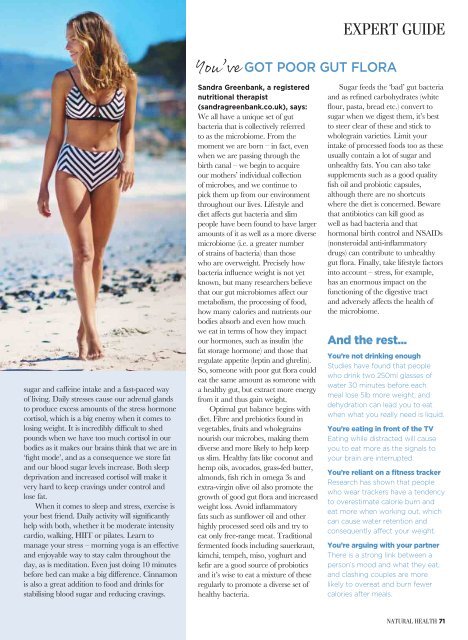Create successful ePaper yourself
Turn your PDF publications into a flip-book with our unique Google optimized e-Paper software.
EXPERT GUIDE<br />
sugar and caffeine intake and a fast-paced way<br />
of living. Daily stresses cause our adrenal glands<br />
to produce excess amounts of the stress hormone<br />
cortisol, which is a big enemy when it comes to<br />
losing weight. It is incredibly difficult to shed<br />
pounds when we have too much cortisol in our<br />
bodies as it makes our brains think that we are in<br />
‘fight mode’, and as a consequence we store fat<br />
and our blood sugar levels increase. Both sleep<br />
deprivation and increased cortisol will make it<br />
very hard to keep cravings under control and<br />
lose fat.<br />
When it comes to sleep and stress, exercise is<br />
your best friend. Daily activity will significantly<br />
help with both, whether it be moderate intensity<br />
cardio, walking, HIIT or pilates. Learn to<br />
manage your stress – morning yoga is an effective<br />
and enjoyable way to stay calm throughout the<br />
day, as is meditation. Even just doing 10 minutes<br />
before bed can make a big difference. Cinnamon<br />
is also a great addition to food and drinks for<br />
stabilising blood sugar and reducing cravings.<br />
You’ve GOT POOR GUT FLORA<br />
Sandra Greenbank, a registered<br />
nutritional therapist<br />
(sandragreenbank.co.uk), says:<br />
We all have a unique set of gut<br />
bacteria that is collectively referred<br />
to as the microbiome. From the<br />
moment we are born – in fact, even<br />
when we are passing through the<br />
birth canal – we begin to acquire<br />
our mothers’ individual collection<br />
of microbes, and we continue to<br />
pick them up from our environment<br />
throughout our lives. Lifestyle and<br />
diet affects gut bacteria and slim<br />
people have been found to have larger<br />
amounts of it as well as a more diverse<br />
microbiome (i.e. a greater number<br />
of strains of bacteria) than those<br />
who are overweight. Precisely how<br />
bacteria influence weight is not yet<br />
known, but many researchers believe<br />
that our gut microbiomes affect our<br />
metabolism, the processing of food,<br />
how many calories and nutrients our<br />
bodies absorb and even how much<br />
we eat in terms of how they impact<br />
our hormones, such as insulin (the<br />
fat storage hormone) and those that<br />
regulate appetite (leptin and ghrelin).<br />
So, someone with poor gut flora could<br />
eat the same amount as someone with<br />
a healthy gut, but extract more energy<br />
from it and thus gain weight.<br />
Optimal gut balance begins with<br />
diet. Fibre and prebiotics found in<br />
vegetables, fruits and wholegrains<br />
nourish our microbes, making them<br />
diverse and more likely to help keep<br />
us slim. <strong>Health</strong>y fats like coconut and<br />
hemp oils, avocados, grass-fed butter,<br />
almonds, fish rich in omega 3s and<br />
extra-virgin olive oil also promote the<br />
growth of good gut flora and increased<br />
weight loss. Avoid inflammatory<br />
fats such as sunflower oil and other<br />
highly processed seed oils and try to<br />
eat only free-range meat. Traditional<br />
fermented foods including sauerkraut,<br />
kimchi, tempeh, miso, yoghurt and<br />
kefir are a good source of probiotics<br />
and it’s wise to eat a mixture of these<br />
regularly to promote a diverse set of<br />
healthy bacteria.<br />
Sugar feeds the ‘bad’ gut bacteria<br />
and as refined carbohydrates (white<br />
flour, pasta, bread etc.) convert to<br />
sugar when we digest them, it’s best<br />
to steer clear of these and stick to<br />
wholegrain varieties. Limit your<br />
intake of processed foods too as these<br />
usually contain a lot of sugar and<br />
unhealthy fats. You can also take<br />
supplements such as a good quality<br />
fish oil and probiotic capsules,<br />
although there are no shortcuts<br />
where the diet is concerned. Beware<br />
that antibiotics can kill good as<br />
well as bad bacteria and that<br />
hormonal birth control and NSAIDs<br />
(nonsteroidal anti-inflammatory<br />
drugs) can contribute to unhealthy<br />
gut flora. Finally, take lifestyle factors<br />
into account – stress, for example,<br />
has an enormous impact on the<br />
functioning of the digestive tract<br />
and adversely affects the health of<br />
the microbiome.<br />
And the rest...<br />
You’re not drinking enough<br />
Studies have found that people<br />
who drink two 250ml glasses of<br />
water 30 minutes before each<br />
meal lose 5lb more weight, and<br />
dehydration can lead you to eat<br />
when what you really need is liquid.<br />
You’re eating in front of the TV<br />
Eating while distracted will cause<br />
you to eat more as the signals to<br />
your brain are interrupted.<br />
You’re reliant on a fitness tracker<br />
Research has shown that people<br />
who wear trackers have a tendency<br />
to overestimate calorie burn and<br />
eat more when working out, which<br />
can cause water retention and<br />
consequently affect your weight.<br />
You’re arguing with your partner<br />
There is a strong link between a<br />
person’s mood and what they eat,<br />
and clashing couples are more<br />
likely to overeat and burn fewer<br />
calories after meals.<br />
NATURAL HEALTH 71


















